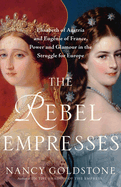
No longer "attractive footnotes on the pages of history," Empresses Elisabeth of Austria and Eugénie of France receive long overdue attention in Nancy Goldstone's beguiling The Rebel Empresses. With her trademark wit and chatty prose style, Goldstone (The Rival Queens) reveals the women who married Emperor Franz Joseph and Napoleon III, respectively: two women intertwined with a 19th-century Europe that heaved with political and technological change. Elisabeth, known as "Sisi," was born to a Bavarian duke and duchess in 1837. She was adventurous, athletic, and discovered that the "suffocating rigidity" of the Austrian imperial court was equal in its miseries only to her overbearing mother-in-law, the Archduchess Sophia. Elisabeth's power, however, resided in her "popularity, especially with the lower classes," and "existed on a different plane," Goldstone writes. "Elisabeth decided in 1864 to devote herself to becoming fluent in Hungarian," a political statement that "defied the disapproval and dogma of the court"; her championing of Hungarian civil rights would lead to the power-sharing agreement known as the dual monarchy of Austria-Hungary.
In France, Spanish-born Eugénie was a "fighter" who learned power politics from her husband (as well as how to move past his serial philandering) and took on the ill-fated conquest of Mexico as her own personal project. Her keen understanding of politics and foreign affairs made Napoleon III feel comfortable naming her as regent when he led his armies to fight the Sardinian War of 1859. Goldstone alternates chapters chronicling Elisabeth's and Eugenie's particular tragedies and triumphs, gilding her studious research with lighthearted footnotes throughout. The Rebel Empresses is a rewarding look at two women who bucked the traditional expectations of their gender and station. --Peggy Kurkowski, book reviewer and copywriter in Denver

